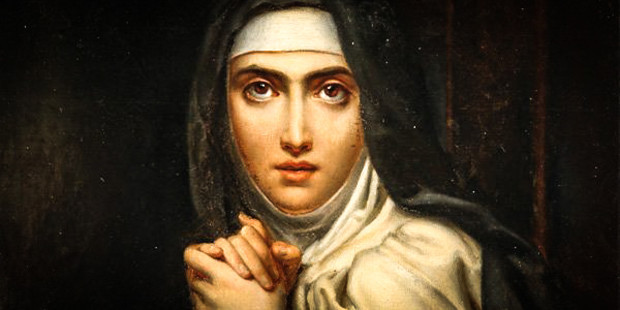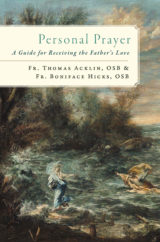By Fr. Boniface Hicks, OSB, and Fr. Thomas Acklin, OSB
Fr. Boniface Hicks, OSB, is a Benedictine monk of St. Vincent Archabbey in Latrobe, Pennsylvania. He has provided spiritual direction for many men and women, including married couples, seminarians, consecrated religious, and priests.
Fr. Thomas Acklin, OSB, is is a Benedictine monk of Saint Vincent Archabbey in Latrobe, Pennsylvania. He is a psychoanalyst as well as a spiritual director. Fr. Acklin has been a professor and spiritual director at Saint Vincent Seminary, where he also served as rector.

What are the depths of our hidden God into which we are entering when we pray? The greatest saints have not penetrated to the depths of themselves, nor the greatest psychoanalysts, nor the greatest mystics or gurus. When we consider that we are made in the image of God and we have immortal souls, we know we have an infinite capacity. This helps us imagine how exponentially greater must be the proportion of our heart or human spirit which we do not know or ever tap into. Indeed, we are a bottomless pit! We know this when we try to fill or fulfill ourselves. There is a place deep in us where God is most present. We come to know that place in knowing Him. We never exhaustively know that place; only God does, for it is God who sustains everything, knows everything, loves everything, from the inside out. Then we discover that God has loved us first! It is not we who make room for God, it is God who makes room for us. If God is infinitely beyond us, only He can unite us with Himself, and He does so by making us totally one with Him who is closer to us than we are to ourselves.
Two of the things we dislike most about prayer are when we pray and don’t hear anything, or when we pray and it is all dry and dark. We feel that prayer then is not good, is not working. In fact, these are two of the things that indicate we are truly praying to God and connecting with Him who is hidden, and not just entertaining our own thoughts and feelings.
We actually should seek the darkness and seek the silence, not try to avoid them! Because God is infinite, because He is not locatable to be found or seen in space and time, He can only be seen in the darkness of my senses, both exterior (the five senses) and even interior (the imagination and memory). God is hidden because He is greater than these and cannot be contained, localized, or objectified in a finite way, and He is only available to faith which sees in darkness, sees in secret. Likewise, faith only sees or hears God hidden in silence and in darkness.
Catholic doctrine has shown us that God’s existence is reasonable, but reason and concepts only give us hints of Him, not a direct knowledge of Him any more than the five senses give us a direct perception of Him. Our imagination likewise cannot grasp Him. We can use images of the imagination and concepts of reason only to achieve analogous knowledge of Him, not direct comprehension. Dionysius said, “Since [God] is the Cause of all beings, we should posit and ascribe to [Him] all the affirmations we make in regard to beings, and, more appropriately, we should negate all these affirmations, since [He] surpasses all being.” Only faith is capable of directly knowing God, and that is in a darkness of the understanding and imagination.
Therefore, reading about Him, even in the scriptures, and imagining Him can only lead us into prayer and deeper into faith. When faith is darkest, then we are closest to understanding. God speaks in the faith that is fostered by the most absolute silence, for in fact the darkness is overwhelming light, infinite light, and the silence is not the mere absence of noise but the silence of potential sound. It is not a silence that stifles words, but a silence that makes sounds or words possible, the silence that allows us to hear at all, to hear God at all.
As we have seen, God’s pure gift of supernatural faith builds upon our own natural efforts. Because faith as a supernatural gift is infused, or directly “poured in,” the obscurity in faith contains its greatest certitude. Such supernatural faith is obscure because it is given in the darkness of the interior and exterior senses. It is certain because its certitude and authority rest in its giver, God. This is therefore not a natural certitude but a supernatural certitude, just as the obscurity is not a natural obscurity but a supernatural obscurity. The certitude does not remove the obscurity because God cannot be known or seen by anything but supernatural faith, and then He is seen in darkness and heard in silence. Thus the silence and obscurity are not a deficit or deprivation in prayer but are the only way in which we can make the direct contact with God which supernatural faith alone provides.
These are not word games or sleight of hand maneuvers. This is not taking refuge in mysticism and unknowing. It is an attempt to see why God is hidden. It demonstrates the contemplative mystical element of all prayer. It shows why the saints and mystics claim that, in order to reach such supernatural contemplation, one must enter into a night of internal and external senses in which it seems we are losing faith, for indeed natural faith does fade as supernatural faith takes over. If nothing that can be seen reveals God or is God, God can only be seen by entering into darkness or “unseeing.” If God cannot be heard in the ordinary way, He must be heard in silence.
You Might Also Like

Prayer is at the heart of the Christian life. Given that we are weak and even sinful human beings, how can it be that God has anything to do with us? What does it mean to have a personal relationship with God? Why is God so silent and hidden? How do we grow in prayer? Personal Prayer: A Guide for Receiving the Father’s Love brings the depth of human experience together with the Catholic tradition of prayer to present the path to an intimate and vulnerable relationship with God.

